IOSR Journal of Business and Management
Added on 2022-09-08
21 Pages5481 Words39 Views
Running head: TOURISM
Sustainable Tourism
Name of the student
Name of the university
Author Note:
Sustainable Tourism
Name of the student
Name of the university
Author Note:
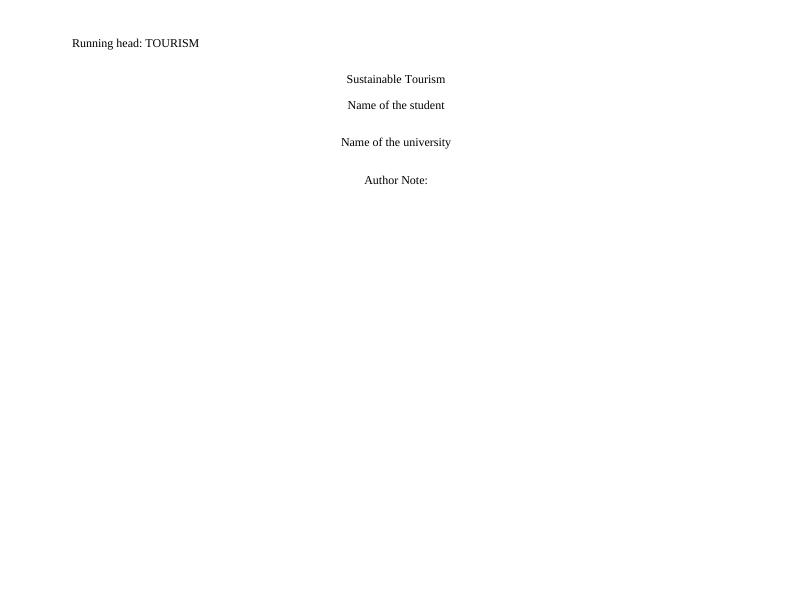
1TOURISM
Introduction:
Sustainable tourism refers to the practice of carrying out tourism by having minimal environmental effects. As per the World
Tourism Organisation, the United Nations, sustainable sustainable tourism is the integration of triple bottom line with tourism
activities (Unwto.org., 2020). The stakeholders to the tourism industries operate in ways so as to protect the interests of the society
and the environment besides generating high profits. Paulauskaite et al. (2017) mentions that one of the most important trend in the
tourism industry is that consumers today want to gain authentic experiences of the tourist destinations they visit. For example, they
want to enjoy the natural beauty of destinations, interact with the local people and obtain articles like pictures depicting traditions.
Singh (2017) mentions that tourist destinations have to ensure customer satisfaction in order to retain customers and generate revenue.
Thus, combining the thoughts presented in previous two articles, one can point out that it has become extremely important to ensure
environmental sustainability of tourist destinations like beaches in order to ensure authentic experiences to the tourists and generate
revenue. Tourism is one of fastest growing industries globally both in terms of GDP and employment generation (Reed, 2019). Thus,
sustainability in tourism has become extremely important to ensure that nations dependent on the industry, both the developed, and
emerging nations are able to profit from it. In fact, tourism has the potential of driving economic growth of poor economies like
Tanzania (Unctad.org, 2017). The aim of the paper would be present of a scrap book containing articles, pictures and book reviews, all
revolving around sustainable tourism.
Introduction:
Sustainable tourism refers to the practice of carrying out tourism by having minimal environmental effects. As per the World
Tourism Organisation, the United Nations, sustainable sustainable tourism is the integration of triple bottom line with tourism
activities (Unwto.org., 2020). The stakeholders to the tourism industries operate in ways so as to protect the interests of the society
and the environment besides generating high profits. Paulauskaite et al. (2017) mentions that one of the most important trend in the
tourism industry is that consumers today want to gain authentic experiences of the tourist destinations they visit. For example, they
want to enjoy the natural beauty of destinations, interact with the local people and obtain articles like pictures depicting traditions.
Singh (2017) mentions that tourist destinations have to ensure customer satisfaction in order to retain customers and generate revenue.
Thus, combining the thoughts presented in previous two articles, one can point out that it has become extremely important to ensure
environmental sustainability of tourist destinations like beaches in order to ensure authentic experiences to the tourists and generate
revenue. Tourism is one of fastest growing industries globally both in terms of GDP and employment generation (Reed, 2019). Thus,
sustainability in tourism has become extremely important to ensure that nations dependent on the industry, both the developed, and
emerging nations are able to profit from it. In fact, tourism has the potential of driving economic growth of poor economies like
Tanzania (Unctad.org, 2017). The aim of the paper would be present of a scrap book containing articles, pictures and book reviews, all
revolving around sustainable tourism.
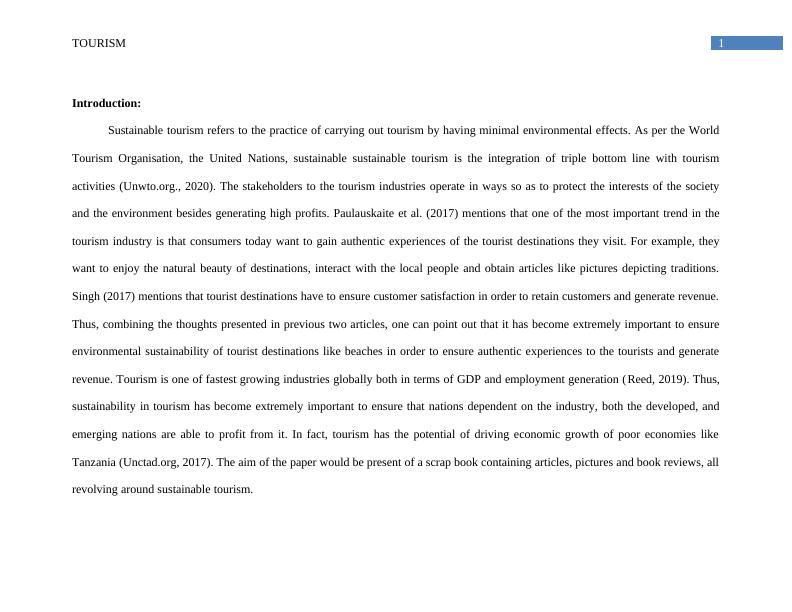
2TOURISM
Commentary:
The exhibits below shows that sustainable tourism has gained important positions in both developed and emerging nations
(Unctad.org, 2017). In fact, the middle income nations like Tanzania are also harnessing immense benefits like economic development
and foreign exchange earnings by serving tourists from all round the globe (Tanzaniatourism.go.tz, 2020). Gaining of sustainability
has emerged as the necessity among highly visited and sought after destinations like Hawaii (Huffingtonpost.in, 2015). Countries
having diverse culture and rich heritage like India can market their cultural diversities and ability to create rich tourist experiences, to
attract large numbers of tourists to generate high income (Indiatoday.in, 2016). However, sustainable tourism faces several threats like
environmental pollution which tend to damage ecological balance and ability of destinations to sustainable lives (Gabbatiss, 2018). It
transpires from the discussion that sustainable tourism has several benefits. For example, in order to attract tourists nations have to
maintain their tourist spots like hills and sea beaches, thus ensuring sustainability in these fragile ecosystems. Sustainable tourism
allows the tribal communities associated with certain tourist destinations serve tourists, thereby earning revenue. Thus, sustainability
in tourism has enforced revenue generation among local communities. However, threats like pollution have to tackled to preserve
sustainability in the industry.
Commentary:
The exhibits below shows that sustainable tourism has gained important positions in both developed and emerging nations
(Unctad.org, 2017). In fact, the middle income nations like Tanzania are also harnessing immense benefits like economic development
and foreign exchange earnings by serving tourists from all round the globe (Tanzaniatourism.go.tz, 2020). Gaining of sustainability
has emerged as the necessity among highly visited and sought after destinations like Hawaii (Huffingtonpost.in, 2015). Countries
having diverse culture and rich heritage like India can market their cultural diversities and ability to create rich tourist experiences, to
attract large numbers of tourists to generate high income (Indiatoday.in, 2016). However, sustainable tourism faces several threats like
environmental pollution which tend to damage ecological balance and ability of destinations to sustainable lives (Gabbatiss, 2018). It
transpires from the discussion that sustainable tourism has several benefits. For example, in order to attract tourists nations have to
maintain their tourist spots like hills and sea beaches, thus ensuring sustainability in these fragile ecosystems. Sustainable tourism
allows the tribal communities associated with certain tourist destinations serve tourists, thereby earning revenue. Thus, sustainability
in tourism has enforced revenue generation among local communities. However, threats like pollution have to tackled to preserve
sustainability in the industry.
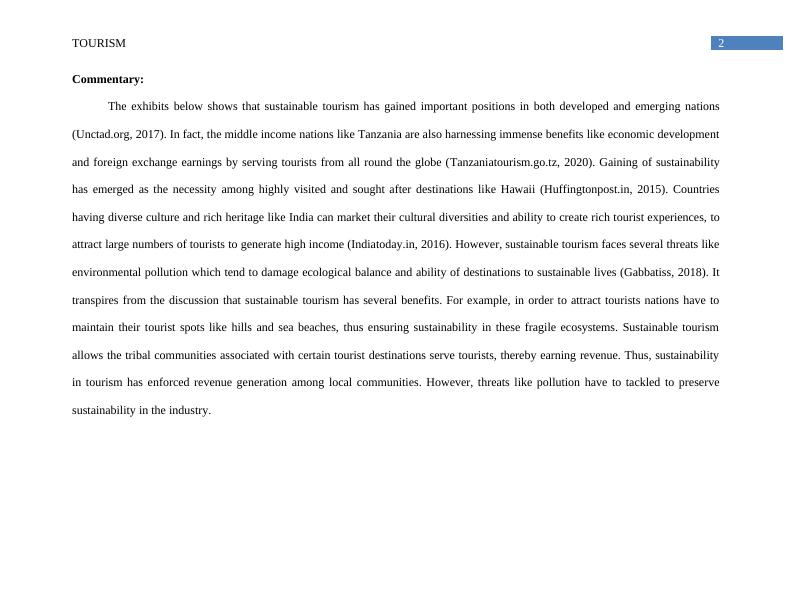
3TOURISM
Supporting elements like articles, book reviews and pictures:
Exhibit 1. Economic development in Africa: Tourism for transformative and inclusive growth (Source: Unctad.org, 2017)
Introduction 1. The United Nations designated 2017 as the International Year of Sustainable Tourism for Development. The tourism
sector has been praised for its capacity to stimulate economic growth through the creation of jobs and by attracting investment and
fostering entrepreneurship, while also contributing, if properly harnessed, to preservation of ecosystems and biodiversity, protection of
cultural heritage and promotion of empowerment of local communities. 2. Tourism can be an engine for inclusive growth and
sustainable economic development. Since the 1990s, tourism has increasingly contributed to Africa’s growth, employment and trade.
During 1995–2014, international tourist arrivals to Africa grew by an average of 6 per cent per year and tourism export revenues, 9 per
cent per year. The average total contribution of tourism to gross domestic product (GDP) increased from $69 billion in 1995–1998 to
$166 billion in 2011–2014, that is from 6.8 per cent of GDP in Africa to 8.5 per cent of GDP. Furthermore, tourism generated more
than 21 million jobs on average in 2011–2014, which translates into 7.1 per cent of all jobs in Africa. This means that over the period
2011–2014, the tourism industry was supporting 1 out of every 14 jobs. At the same time, tourism has also been associated with
operating in isolation from other parts of the economy, suffering from high financial leakage, generating sociocultural tensions and
environmental damage. History suggests that countries cannot rely on tourism as the sole avenue out of poverty or the only pathway to
sustainable economic development. 3. Tourism’s potential has been recognized by policymakers at the national and international
levels, and is increasingly reflected in national and international policy frameworks. At the global level, Sustainable Development
Goals 8, 12 and 14 highlight the central role of tourism in job creation, local promotion of culture and economic development.
Supporting elements like articles, book reviews and pictures:
Exhibit 1. Economic development in Africa: Tourism for transformative and inclusive growth (Source: Unctad.org, 2017)
Introduction 1. The United Nations designated 2017 as the International Year of Sustainable Tourism for Development. The tourism
sector has been praised for its capacity to stimulate economic growth through the creation of jobs and by attracting investment and
fostering entrepreneurship, while also contributing, if properly harnessed, to preservation of ecosystems and biodiversity, protection of
cultural heritage and promotion of empowerment of local communities. 2. Tourism can be an engine for inclusive growth and
sustainable economic development. Since the 1990s, tourism has increasingly contributed to Africa’s growth, employment and trade.
During 1995–2014, international tourist arrivals to Africa grew by an average of 6 per cent per year and tourism export revenues, 9 per
cent per year. The average total contribution of tourism to gross domestic product (GDP) increased from $69 billion in 1995–1998 to
$166 billion in 2011–2014, that is from 6.8 per cent of GDP in Africa to 8.5 per cent of GDP. Furthermore, tourism generated more
than 21 million jobs on average in 2011–2014, which translates into 7.1 per cent of all jobs in Africa. This means that over the period
2011–2014, the tourism industry was supporting 1 out of every 14 jobs. At the same time, tourism has also been associated with
operating in isolation from other parts of the economy, suffering from high financial leakage, generating sociocultural tensions and
environmental damage. History suggests that countries cannot rely on tourism as the sole avenue out of poverty or the only pathway to
sustainable economic development. 3. Tourism’s potential has been recognized by policymakers at the national and international
levels, and is increasingly reflected in national and international policy frameworks. At the global level, Sustainable Development
Goals 8, 12 and 14 highlight the central role of tourism in job creation, local promotion of culture and economic development.
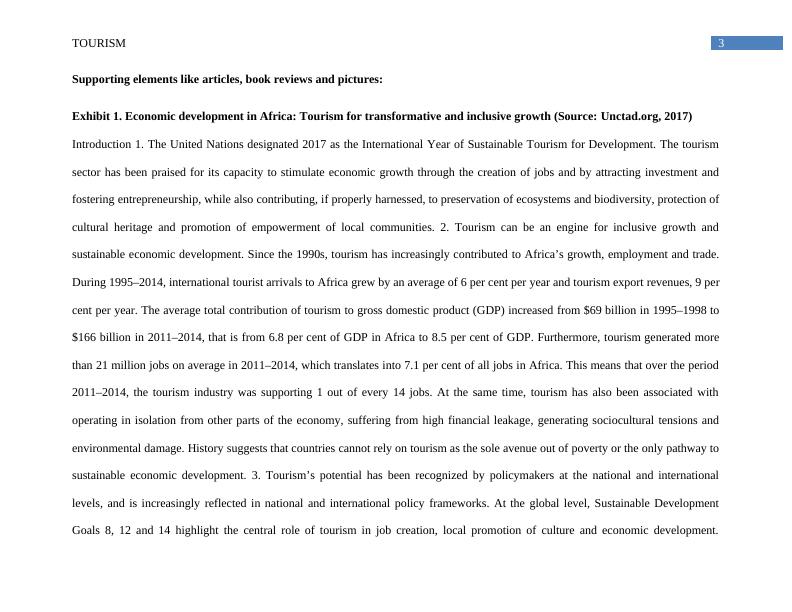
4TOURISM
However, as tourism covers several sectors and is a cross-cutting issue, the development of tourism has an impact on many
Sustainable Development Goals, for example poverty, decent work, gender and infrastructure development. 4. At the continental level,
the African Union’s Agenda 2063 and the Tourism Action Plan under its New Partnership for Africa’s Development recognize
tourism’s importance in driving Africa’s socioeconomic development and structural transformation through job creation, in catalysing
growth in other productive sectors and in fostering inclusion through the participation of women and youth in the sector’s activities. 5.
At the regional level, the policy frameworks of several regional economic communities, including the 1998 Protocol on Tourism of
South African Development Community, the Sustainable Tourism Development Framework of the Common Market for Eastern and
Southern Africa and the Sustainable Tourism Master Plan 2013–2023 of the Intergovernmental Authority on Development, highlight
tourism’s importance in supporting socioeconomic development. 6. At the national level, most African countries have national
development plans that outline a country’s vision for its future and identify planned policies and sectoral priorities, which highlight the
importance of tourism. 7. The Economic Development in Africa Report 2017: Tourism for Transformative and Inclusive Growth
examines the role that tourism can play in Africa’s development process. It argues that tourism can be an engine for inclusive growth
and economic development and that it can complement development strategies aimed at fostering economic diversification and
structural transformation within the right policy context. The report does not focus on climate change or its financing aspects as these
have been taken up in much greater detail in recent publications on the sector. The focus is rather on enhancing the role that tourism
can play in socioeconomic development, poverty alleviation, trade, fostering regional integration and structural transformation. To
achieve all of this, Africa must tackle key impediments to developing the tourism sector, such as weak intersectoral linkages.
However, as tourism covers several sectors and is a cross-cutting issue, the development of tourism has an impact on many
Sustainable Development Goals, for example poverty, decent work, gender and infrastructure development. 4. At the continental level,
the African Union’s Agenda 2063 and the Tourism Action Plan under its New Partnership for Africa’s Development recognize
tourism’s importance in driving Africa’s socioeconomic development and structural transformation through job creation, in catalysing
growth in other productive sectors and in fostering inclusion through the participation of women and youth in the sector’s activities. 5.
At the regional level, the policy frameworks of several regional economic communities, including the 1998 Protocol on Tourism of
South African Development Community, the Sustainable Tourism Development Framework of the Common Market for Eastern and
Southern Africa and the Sustainable Tourism Master Plan 2013–2023 of the Intergovernmental Authority on Development, highlight
tourism’s importance in supporting socioeconomic development. 6. At the national level, most African countries have national
development plans that outline a country’s vision for its future and identify planned policies and sectoral priorities, which highlight the
importance of tourism. 7. The Economic Development in Africa Report 2017: Tourism for Transformative and Inclusive Growth
examines the role that tourism can play in Africa’s development process. It argues that tourism can be an engine for inclusive growth
and economic development and that it can complement development strategies aimed at fostering economic diversification and
structural transformation within the right policy context. The report does not focus on climate change or its financing aspects as these
have been taken up in much greater detail in recent publications on the sector. The focus is rather on enhancing the role that tourism
can play in socioeconomic development, poverty alleviation, trade, fostering regional integration and structural transformation. To
achieve all of this, Africa must tackle key impediments to developing the tourism sector, such as weak intersectoral linkages.
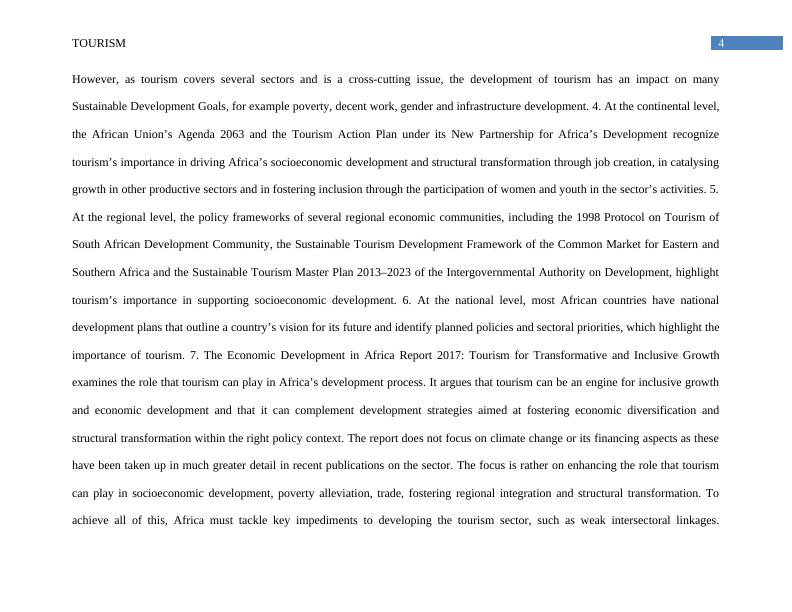
5TOURISM
TD/B/64/2 3 8. Tourism can also be an important contributor to economic development for several reasons. Specifically: (a) Tourism
has the capacity to significantly contribute to GDP, employment and export earnings. (b) The sector can also offer a compelling case
for prioritization for socioeconomic development in Africa. Tourism is a relatively job-rich sector and employs comparatively high
shares of women and youth. Globally, women make up between 60 and 70 per cent of the tourism labour force, and half of its workers
are aged 25 or younger. It thus has the potential to foster more inclusive growth. (c) With rising disposable incomes and hence more
resources available for leisure and travel, as well as globalization which boosts business travel, the forecast for tourism is positive. It is
expected that international tourist arrivals to Africa will continue to grow robustly to 134 million arrivals by 2030 (World Tourism
Organization (UNWTO), 2016). (d) Given that globally most international travel takes place within a traveller’s own region and that,
with a rising African middle class, continental disposable incomes are likely to increase, there is greater scope for boosting continental
and intraregional travel in Africa. (e) Tourism also has the capacity to generate and spread incomes and has strong spillover effects for
poverty reduction through stronger linkages. Strong linkages catalyse a multiplier effect that can generate broad-based economic
benefits at the national level, as well as in situ employment opportunities and poverty reduction at the local level. In many African
countries, however, tourism linkages remain weak and underexploited. Consequently, much of the value added in the tourism sector is
captured by foreign investors, international tour operators and foreign airline companies, while often only limited benefits remain
within the destination country and flow to the poor. Thus, better linkages can lead to, inter alia, more jobs for the most vulnerable
groups in society, the poor, women and youth. (f) The promotion of peace, justice and strong institutions are prerequisites for
achieving any economic development goals. This is clearly also the case for goals related to the development of tourism. 9. Most
TD/B/64/2 3 8. Tourism can also be an important contributor to economic development for several reasons. Specifically: (a) Tourism
has the capacity to significantly contribute to GDP, employment and export earnings. (b) The sector can also offer a compelling case
for prioritization for socioeconomic development in Africa. Tourism is a relatively job-rich sector and employs comparatively high
shares of women and youth. Globally, women make up between 60 and 70 per cent of the tourism labour force, and half of its workers
are aged 25 or younger. It thus has the potential to foster more inclusive growth. (c) With rising disposable incomes and hence more
resources available for leisure and travel, as well as globalization which boosts business travel, the forecast for tourism is positive. It is
expected that international tourist arrivals to Africa will continue to grow robustly to 134 million arrivals by 2030 (World Tourism
Organization (UNWTO), 2016). (d) Given that globally most international travel takes place within a traveller’s own region and that,
with a rising African middle class, continental disposable incomes are likely to increase, there is greater scope for boosting continental
and intraregional travel in Africa. (e) Tourism also has the capacity to generate and spread incomes and has strong spillover effects for
poverty reduction through stronger linkages. Strong linkages catalyse a multiplier effect that can generate broad-based economic
benefits at the national level, as well as in situ employment opportunities and poverty reduction at the local level. In many African
countries, however, tourism linkages remain weak and underexploited. Consequently, much of the value added in the tourism sector is
captured by foreign investors, international tour operators and foreign airline companies, while often only limited benefits remain
within the destination country and flow to the poor. Thus, better linkages can lead to, inter alia, more jobs for the most vulnerable
groups in society, the poor, women and youth. (f) The promotion of peace, justice and strong institutions are prerequisites for
achieving any economic development goals. This is clearly also the case for goals related to the development of tourism. 9. Most
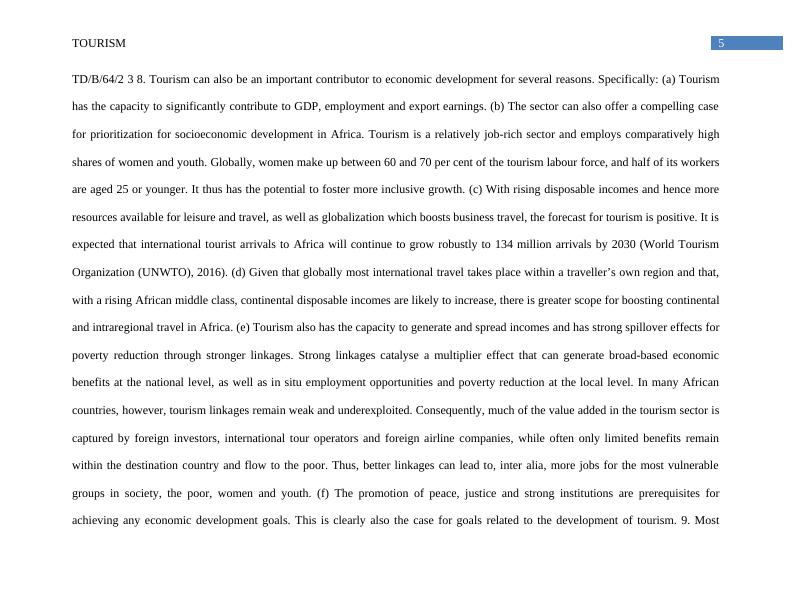
End of preview
Want to access all the pages? Upload your documents or become a member.
Related Documents
Sustainability of the Serengeti-lg...
|14
|2322
|15
Tourist Destination Assignment : Virgin Holidays Ltdlg...
|14
|4186
|481
Sustainability in Tourism: A Case Study of Bondi Beach in Australialg...
|6
|2115
|196
Unit 9: Tourist Destination Task 2 Understand the cultural,lg...
|5
|273
|217
Tourism in Global Contextlg...
|6
|1103
|150
Impacts of Tourism on Society: Positive and Negative Effectslg...
|10
|3006
|249